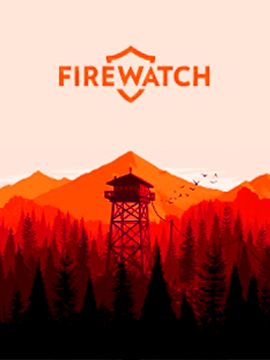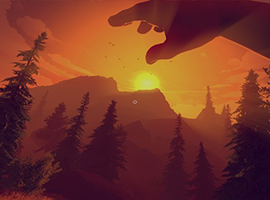FIREWATCH REVIEW

Once you arrive there, Firewatch’s powerful ambiance takes hold. The story takes place over the course of an entire summer, with different “days” – which are treated as chapters of the story – playing out at different hours of the day and night. That allows bold reds, yellows, and oranges to color this fictional Wyoming forest’s beautifully painted scenery (a contribution by renowned illustrator Olly Moss) – all in a comfortable and immersive first-person perspective. It is a testament to both Moss and Firewatch’s level designers that, even despite the stylized look, the Two Forks Woods sticks in my mind like a real place: the narrow passage through Thunder Canyon, the serene calm of Jonesy Lake, the comically small size of Pork Pond, and the unexplained mystery of the Medicine Wheel. In fact, only the strange absence of almost any wildlife whatsoever betrays the convincing setting. Firewatch sounds as good as it looks, thanks to a world-class script acted to perfection by its two leads. Rookie lookout Henry is given a playful vulnerability; you can choose to play him serious or funny, and the performance is up to the task either way. Henry’s boss – and primary point of human contact for the entire summer – is Delilah. Her emotional armor is thick, and she shows the cracks in her personality we’re allowed to see as we play without resorting to being overdramatic.
Right from the jump, their relationship feels real, despite the fact that they’re communicating entirely via radio, with no faces on screen to lend emotional cues. Henry – or Hank, as she sometimes defiantly calls him – comes across as a good man at heart, but a flawed one – a man not sure about whether or not to go back to the life he left behind in Boulder, Colorado. He is fully capable of matching wits with Delilah, who uses humor as a shield for the personal life she doesn’t like discussing as they get to know each other over the course of the summer.
It’s a pair of firework-launching teenage girls that set Firewatch’s story in motion, and you can choose to talk to Delilah at almost any time by bringing up your two-way radio. She’s got something to say about almost everything, whether you need advice on how to handle a given situation or you’re just reporting your progress on a task she’s given you, and she’s so engaging that I found myself eager to call about every little thing I came across. Things get darker – in a figurative as well as a sometimes literal sense – when the teens go missing, and you and Delilah try to piece together the puzzle of their whereabouts while making your own critical (sometimes difficult) decisions.
It’s tense, scary, and funny – sometimes all within a few minutes of each other.There were points where I was afraid to turn around in the vast, lonely woods.
The writing here is simply head and shoulders above nearly every other game I’ve ever played. In fact, Firewatch’s script, unlike most video games, would also make a fantastic novella that’s every bit as gripping as the game is. It’s tense, scary, and funny – sometimes all within a few minutes of each other. Not a lot of games can successfully claim that.Like other so-called “walking simulators,” the gameplay in Firewatch is the story, though at least there’s more to actually do here than in most games within the genre. A substantial swath of Two Forks Woods is explorable, with supply caches, unique sights, and even a hidden turtle you can adopt (you’re gonna live with me now, Shelly Duvall!). You’ll rappel down cliffsides, climb up rock formations, explore the lookout tower that doubles as your home for the summer, and more. And yet, these same simple actions that are a delightful exploration of your new surroundings at the beginning of the game become almost terrifying as the plot progresses, leading to points where, playing in Henry’s first-person perspective, I was afraid to turn around in the vast, lonely woods.

Speaking of navigation: though I’m thankful there’s no giant arrow at the top of the screen pointing me exactly to where I need to go at any given moment, I did find getting around the Two Forks Woods a bit cumbersome at times, particularly near the end. While I was never hung up for too long, translating the map to the actual trail in front of you had me occasionally taking a wrong fork in the path. Henry’s compass helps a lot, however, so I was never hung up for too long. As for the ending, it’s the only other part of Firewatch I wasn’t crazy about. I want to be very careful not to spoil anything, so I’ll just say that I didn’t quite find the revelation I had hoped for when I reached the end of what the story had been building up to. At the same time, however, I didn’t dislike the ending either. In fact, I find myself still thinking about it, trying to think of missed clues or other small cues that might yet give me the “Ah-ha!” moment I’m after. I’ll be very interested to hear other people’s take on the conclusion – this is the kind of game where the discussions that will arise afterwards are an important extension of the experience itself. Firewatch is amazing for many reasons, but above all because it’s an adult game that deals with serious issues, with realistic adult dialogue to match. And it deals with those issues just like actual adults would: sometimes with humor, sometimes with anger, and sometimes with sadness. It is among the very best of the first-person narrative genre, and it reminds us what video game storytelling is capable of in the right hands. It’s a game I can see coming back to every year or two just to revisit its beautiful sights and memorable characters – just like a good book.

























